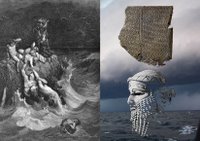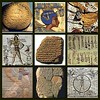The Flood Story : Older Than The Bible

George Smith translated the Flood story from a collection of Assyrian tablets in the British Museum. The tablets were originally at least twelve in number, forming one story or set of legends, the account of the Flood being on the eleventh tablet.
The Flood texts belong to the time of Assurbanipal, or about 660 years before the Christian era, and they were found in the library of that monarch in the palace at Nineveh.
The Biblical account of the Deluge, contained in the sixth to the ninth chapters of Genesis, is of course familiar to us all, so I will only give the outline of the narrative.
According to the Book of Genesis, as man mutiplied on the earth, the whole race turned to evil, except the family of Noah. On account of the wickedness of man, the Lord determined to destroy the world by a flood, and gave command to Noah to build an ark, 300 cubits long, 50 cubits broad, and 30 cubits high. Into this ark Noah entered according to the command of the Lord, taking with him his family, and pairs of each animal.
After seven days the Flood commenced in the 600th year of Noah, the seventeenth day of the second month, and after 150 days the ark rested upon the mountains of Ararat, on the seventeenth day of the seventh month. We are then told that after 40 days Noah opened the window of the ark and sent forth a raven which did not return. He then sent forth a dove, which finding no rest for the sole of her foot, returned to him.Seven days after he sent forth the dove a second time, she returned to him with an olive leaf in her mouth. Again, after seven days, he sent forth the dove which returned to him no more. The Flood was dried up in the 601st year, on the first day of the first month, and on the twenty-seventh day of the second month, Noah removed from the ark and afterwards built an altar and offered sacrifices.
The Chaldean account of the Flood, as given by Berosus, I have taken from Cory's Ancient Fragments, pages 26 to 29, as follows:
"After the death of Ardates, his son Xisuthrus reigned eighteen sari. In his time happened a great Deluge, the history of which is thus described: The Deity, Cronos, appeared to him in a vision, and warned him that upon the fifteenth day of the month Daesius, there would be a flood, by which mankind would be destroyed. He, therefore, enjoined him to write a history of the beginning, procedure, and conclusion of all things; and to bury it in the City of the Sun at Sippara; and to build a vessel, and take with him into it his friends and relations; and to convey on board everything necessary to sustain life, together with all the different animals, both birds and quadrupeds, and trust himself fearlessly to the deep.
Having asked the Deity whither he was to sail? he was answered, 'To the Gods'; upon which he offered up a prayer for the good of mankind. He then obeyed the Divine admonition, and built a vessel five stadia in length, and two in breadth. Into this he put every thing which he had prepared: and last of all conveyed into it his wife, his children, and his friends.
"After the Flood had been upon the earth, and was in time abated, Xisuthrus sent out birds from the vessel, which not finding any food, nor any place whereupon they might rest their feet, returned to him again. After an interval of some days he sent them forth a second time, and they now returned with their feet tinged with mud. He made a trial a third time with these birds, but they returned to him no more: from whence he judged that the surface of the earth had appeared above the waters. He, therefore, made an opening in the vessel, and upon looking out found that it was stranded upon the side of some mountain, upon which he immediately quitted it with his wife, his daughter, and the pilot.
Xisuthrus then paid his adoration to the earth, and having constructed an altar, offered sacrifices to the gods, and, with those who had come out of the vessel with him, disappeared."They, who remained within, finding that their companions did not return, quitted the vessel with many lamentations, and called con tinually on the name of Xisuthrus. Him they saw no more; but they could distinguish his voice in the air, and could hear him admonish them to pay due regard to religion; and likewise informed them that it was upon account of his piety that he was translated to live with the gods, that his wife, and daughter, and the pilot, had obtained the same honor. To this he added that they should return to Babylonia, and as it was ordained, search for the writings at Sippara, which they were to make known to all mankind; moreover, that the place wherein they were was the land of Armenia.
"The rest having heard these words, offered sacrifices to the gods, and taking a circuit, journeyed towards Babylonia. "The vessel being thus stranded in Armenia, some part of it yet remains in the Corcyraean mountains."



















0 Comments:
Post a Comment
<< Home